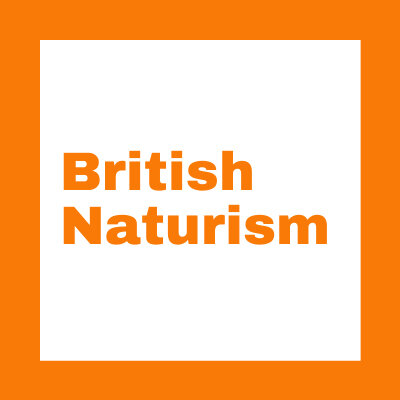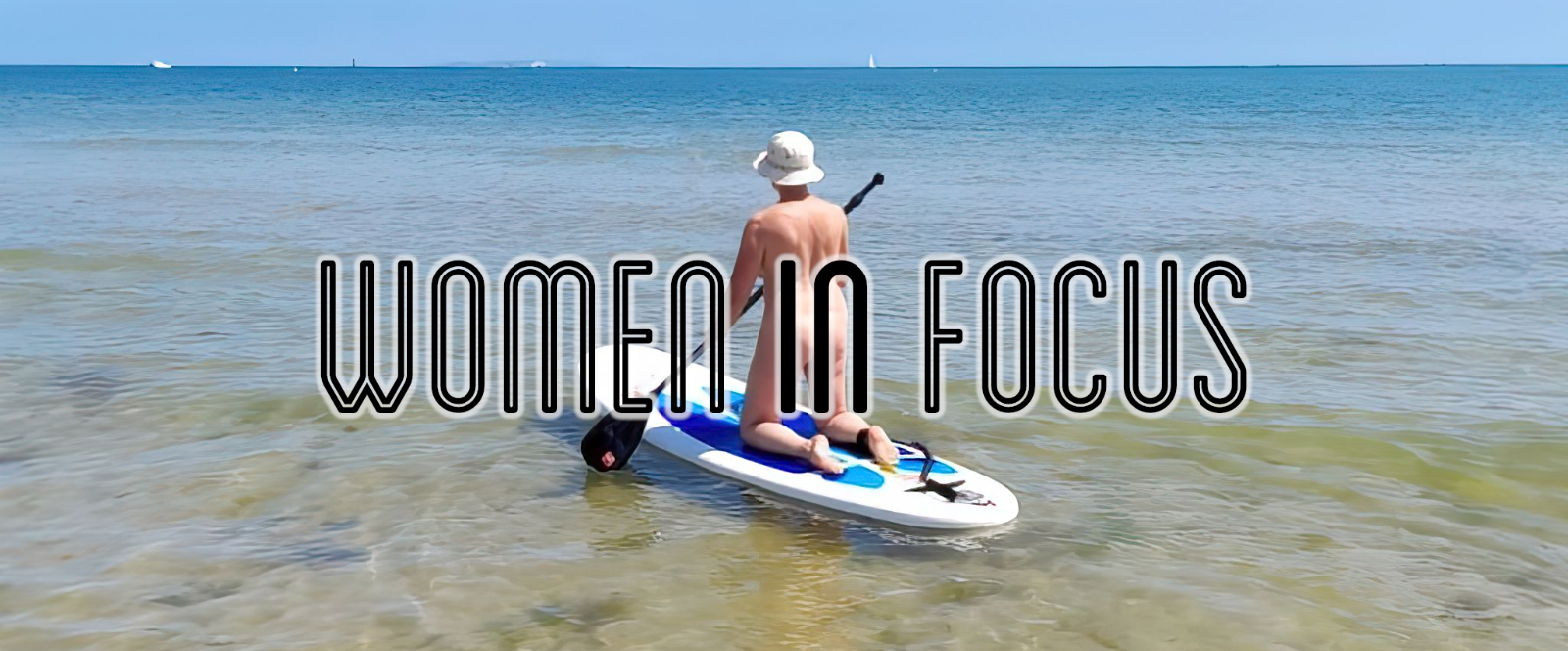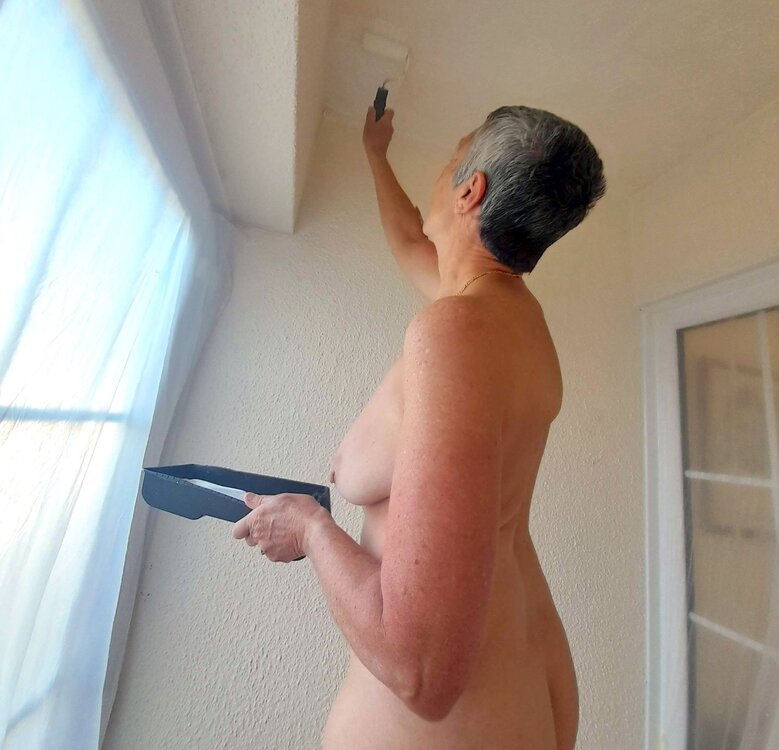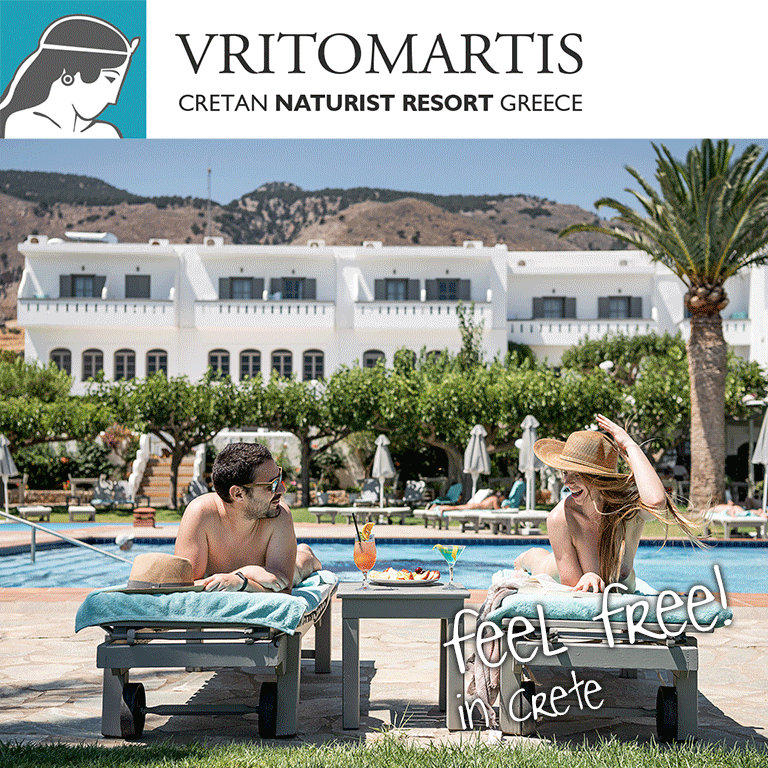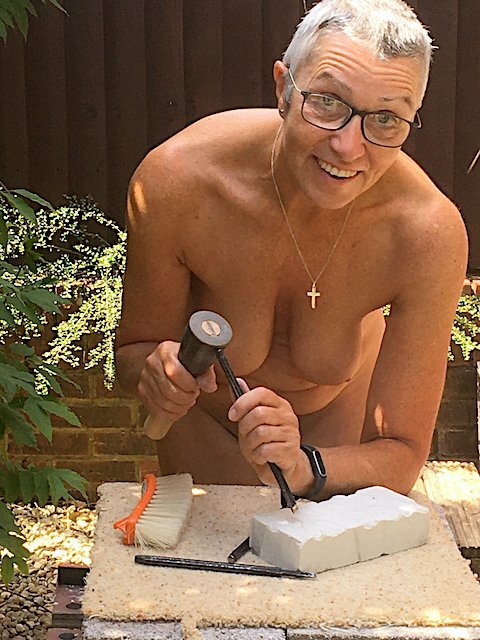 Sheila Maycock is 63 and has been married to Stephen for 40 years. They live in Devon and have 3 daughters and 2 young grandchildren. Sheila says "We’re fortunate to have 2 naturist beaches close by and enjoy accessing them on our kayak and paddleboard. We’re sporty and enjoy tennis, swimming, walking, gardening. I love baking & cooking and also stone carving as a mindful hobby. I’m semi-retired (I used to run a branch of the charity Relate) but still enjoy delivering counselling online to families and individuals, when we’re not travelling to visit family in Australia or exploring Britain or Europe in our motorhome. We are members of the Christian Naturist Fellowship and feel naturism sits well alongside our Christian faith with its’ focus on love, acceptance and non-judgment of our fellow humans. We go to church in Sidmouth and have just started to talk about our skinny dipping at local beaches to test the reactions there, which have been interesting/ amusing!"
Sheila Maycock is 63 and has been married to Stephen for 40 years. They live in Devon and have 3 daughters and 2 young grandchildren. Sheila says "We’re fortunate to have 2 naturist beaches close by and enjoy accessing them on our kayak and paddleboard. We’re sporty and enjoy tennis, swimming, walking, gardening. I love baking & cooking and also stone carving as a mindful hobby. I’m semi-retired (I used to run a branch of the charity Relate) but still enjoy delivering counselling online to families and individuals, when we’re not travelling to visit family in Australia or exploring Britain or Europe in our motorhome. We are members of the Christian Naturist Fellowship and feel naturism sits well alongside our Christian faith with its’ focus on love, acceptance and non-judgment of our fellow humans. We go to church in Sidmouth and have just started to talk about our skinny dipping at local beaches to test the reactions there, which have been interesting/ amusing!"
Q: What got you into naturism/nudism?
A: As with many women it was my husband who first got into naturism by nude sunbathing at Studland when he had given up his job and I was still working. It took him a while to tell me what he was enjoying while I was in the office, but as soon as he suggested we try a naturist campsite in France I was willing to give it a try. I knew him as a man of integrity who would never get into anything remotely dodgy, so had every confidence in him. I was a little nervous and unsure of how naturism worked when we rocked up to our first campsite, but everyone was so welcoming and friendly, which made it very easy for me to relax without my clothes and enjoy the feeling of freedom & liberation that brings. This wouldn’t have been so easy for me when I was younger and far more worried about ‘what people think’, but with age I find that matters far less to me.
Q: Is there a difference between the two labels?
A: Language is an interesting thing and it constantly amazes me that we manage to convey as much to each other as we do, bearing in mind the different meanings we attribute to the same words, experiences or events. I tend to prefer the term naturism as it feels to me to project a greater affinity with nature and a natural state of being. We were born naked – what is more natural than that? Nudism feels more of an ‘arty’ term to me.
Q: How does it impact your life on a day-to-day basis?
A: We are relaxed with clothing at home, depending on the temperature and look for events to attend such as Naked Heart walks and Nudefest. We’re always keen to support naturist events and will happily volunteer as stewards, helpers etc. I thoroughly enjoy writing for the BN magazine, using my professional expertise in Mental Health and I absolutely loved doing a book review of ‘Naked Feminism’ by Victoria Bateman. I tend to be careful who I share my naturism with to protect any concerns about my professional life as a counsellor, as safeguarding is such a preoccupation and unless introduced carefully the majority societal perception of nudity being a sexual concern could be seen as a problem. Having said that no-one who we’ve told about naturism either professionally or personally has ever been anything but supportive and reactions range from embarrassed (them!), mildly interested or intensely curious and wishing they could give it a try.
Q: What challenges do women face in naturism generally?
A: There are significantly more men than women who are active in naturist organisations and attend naturist events but this in itself need never be a barrier for women, as the men I have come across in naturism are keen to encourage women to experience the same freedom as they themselves enjoy and are respectful human beings.
Unfortunately some naturist beaches we have been to or facebook groups I am part of seem to attract men who see it as an opportunity to act in abusive ways. They are culturally and socially conditioned to imagine that a naked woman is there for their sexual requirements. These ‘meerkats’ who pop up out of nowhere for a good look or more, totally misunderstand the ethos and culture of naturism. Fortunately they are also often cowards so if I have the energy, a hard stare, a threat of taking a photo of them or a call to the police will soon see them scuttling away, but it does tend to spoil a pleasant afternoon.
Q: How can we encourage more women to try it?
A: Be kind to yourself when viewing your own body. None of us are perfect, but yours is no better or worse than anyone else’s, just different. I’m just grateful my body (mostly!) continues to work for me.
We need to make it crystal clear that naturism clearly separates nudity and sex. Being naked in a totally non sexual environment is so refreshing. I am a naturally enthusiastic, encouraging and friendly person. The joy of naturism is that you can be naked together and no-one takes that friendliness the wrong way.
Both women and men in naturism are amongst the most non-judgmental, accepting folk you will ever come across. We’re all different shapes and sizes, with lumps and bumps, scars and bits we’re less fond of but after a short while experiencing social nudity none of this matters and we see the person rather than judge the body.
Q: How can women help in desexualising nudity?
A: A culture of put downs and negativity perpetuates today with reality TV and porn sites promoting their own brands of sex and slut shaming / whorephobia endemic on social media and even within feminism. These attitudes then get internalised so that women subconsciously imagine that their body should be perfect ( whatever that means?) and readily available for other’s sexual gratification, so become self-critical, lacking self-acceptance and self-confidence. Build your own confidence by wandering around at home without clothes and go on from there.
Q: What can men do to help in desexualising nudity?
A: Take responsibility for their own sexual reactions, rather than blaming the object of their desires be they male or female. A culture of victim blaming remains a problem in both day to day life and within the judicial system and boys need educating about consent and respect from an early age. There’s a great video on YouTube, which illustrates this in a wonderfully British way:
Q: How can we encourage body positivity and acceptance?
A: We need to continue to normalise all sorts of body types, shapes and sizes. We are fighting against an idealised perfection, which is unreal and unachievable. Be supportive of other people. Encourage each other to accept our own bodies and be comfortable with who we are. There are some great initiatives out there. We recently enjoyed the Naked education’ series on Channel 4 and even M&S recently jumped on the body positivity bandwagon with a display of sculptures of the breasts of 15 M&S workers in London.
I was brought up by a hypercritical mum, who would regularly comment negatively on the appearance of women, so was programmed to notice what was wrong with people. I’ve since learned to notice and support what is right with people instead, which is often more about who they are than what they look like.
Q: What advice would you offer to women curious about naturism?
A: If you’re looking for a safe environment that promotes acceptance and respect then look no further. I’ve walked naked as a lone woman with 40 men and never felt safer in my life. And I had some fabulously interesting conversations as we ambled along. I have an abiding interest in people and those I have met in naturism have thought about, often struggled with and then acted on some of the important things in life and have fascinating stories and opinions to share.
Q: What drives your passion in promoting naturism?
A: We have such fun enjoying the lifestyle and have met so many genuinely lovely, like-minded people. I’m smiling as I write this! Social nudity is a great leveller and I am passionate about equality of opportunity and building self-esteem/ self-acceptance in people who may not historically have had the best experiences in life. Naturism provides a culture that encourages anyone to feel free from the constraints that society places upon them within a culture of mutual respect.
Q: Is your family supportive?
A: My husband enjoys this lifestyle with me and our daughters are accepting of yet another out of the ordinary thing their parents get up to and one of them will occasionally join us. We raised our children to express their individuality, so I guess they reciprocate. I’m not sure my brothers would cope so well tho, so it’s not something we feel the need to share with them.
Q: Has naturism changed since you first got involved?
A: Lockdown accelerated our involvement in naturism, as we benefitted hugely from BN’s online offerings, keeping us sane during the long months of lockdown. The joy of naked yoga, fitness, quizzes and discos in our own lounge will remain one of our abiding memories of the pandemic.
In a movement that has historically been primarily espoused by males and perhaps older couples I’m enjoying seeing the growing agenda of positive support for women and younger people.
Q: How do you see the future of naturism?
A: I am grateful to those who work so hard to influence legislation so that genuine naturists are backed up by the law, which gives us more confidence. It seems that British society may be finally ready for a more open acceptance of nudity. I recently heard that a naturist is giving talks to the WI as her naturism was accepted as a ‘lifestyle choice’ by that renowned organisation. Whatever next?!
Q: Any other thoughts?
A: Naturism seems to be a place where gay men have been able to ‘find their tribe’ but there is perhaps a gap for LGBTQI+ women?
I have to say I’m agnostic about whether women only events are the best way to encourage women into naturism. I accept that some women will be fearful of being seen naked by men or harbour a distaste for seeing naked men due to their own personal, often negative, experiences. On the one hand women only swims, days out, meetings and groups remove concerns about avoiding the male predatory gaze, but on the other it somehow accentuates the fear that naked males are a problem when they are so not in naturism because of our shared philosophy and also because of careful management of events by organisations such as BN. Encouraging nervous people with a clothing optional invitation will often find folk encouraged by the openness of others to shed their own clothing and discover for themselves that the world doesn’t stop and indeed opens up a whole new world of self-acceptance and positive regard regardless of gender.
![]() Sheila featured on episode 14 of the Women in Focus podcast. You can listen to her episode here.
Sheila featured on episode 14 of the Women in Focus podcast. You can listen to her episode here.
